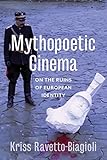Mythopoetic Cinema : On the Ruins of European Identity / Kriss Ravetto-Biagioli.
Material type: TextPublisher: New York, NY : Columbia University Press, [2017]Copyright date: ©2017Description: 1 online resource (352 p.) : 36 b&w imagesContent type:
TextPublisher: New York, NY : Columbia University Press, [2017]Copyright date: ©2017Description: 1 online resource (352 p.) : 36 b&w imagesContent type: - 9780231182188
- 9780231544108
- 791.43094 23
- PN1993.5.E8 R38 2017
- PN1993.5.E8 R38 2017eb
- online - DeGruyter
- Issued also in print.
| Item type | Current library | Call number | URL | Status | Notes | Barcode | |
|---|---|---|---|---|---|---|---|
 eBook
eBook
|
Biblioteca "Angelicum" Pont. Univ. S.Tommaso d'Aquino Nuvola online | online - DeGruyter (Browse shelf(Opens below)) | Online access | Not for loan (Accesso limitato) | Accesso per gli utenti autorizzati / Access for authorized users | (dgr)9780231544108 |
Frontmatter -- CONTENTS -- ACKNOWLEDGMENTS -- INTRODUCTION -- 1. FLOATING ON THE BORDERS OF EUROPE -- 2. O MEGALEXANDROS -- 3. IN BALKAN -- 4. NOTRE MUSIQUE -- EPILOGUE -- NOTES -- BIBLIOGRAPHY -- INDEX
restricted access online access with authorization star
http://purl.org/coar/access_right/c_16ec
In Mythopoetic Cinema, Kriss Ravetto-Biagioli explores how contemporary European filmmakers treat mythopoetics as a critical practice that questions the constant need to provide new identities, a new Europe, and with it a new European cinema after the fall of the Soviet Union. Mythopoetic cinema questions the perpetual branding of movements, ideas, and individuals. Examining the work of Jean-Luc Godard, Alexander Sokurov, Marina Abramović, and Theodoros Angelopoulos, Ravetto-Biagioli argues that these disparate artists provide a critical reflection on what constitutes Europe in the age of neoliberalism. Their films reflect not only the violence of recent years but also help question dominant models of nation building that result in the general failure to respond ethically to rising ethnocentrism.In close readings of such films as Sokurov's Russian Ark (2002) and Godard's Notre Musique (2004), Ravetto-Biagioli demonstrates the ways in which these filmmakers engage and evaluate the recent reconceptualization of Europe's borders, mythic figures, and identity paradoxes. Her work not only analyzes how these filmmakers thematically treat the idea of Europe but also how their work questions the ability of the moving image to challenge conventional ways of understanding history.
Issued also in print.
Mode of access: Internet via World Wide Web.
In English.
Description based on online resource; title from PDF title page (publisher's Web site, viewed 02. Mrz 2022)


